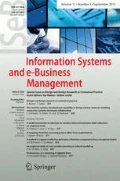While Information Systems continue to transform organizations, organizational IT infrastructures and business models are themselves beginning to change. There is an increased focus on service orientation and performance levels of IT infrastructures and systems. Outsourcing and off shoring strategies are evolving to include utility based approaches to computing. These developments are showing promises of a renewed period of innovative thinking in e-business technologies. The Eighth workshop on e-business held in Phoenix, Arizona in December 2009 engaged over a hundred Information Systems researchers and practitioners to explore and respond to the grand challenges of next generation e-Business systems.
The papers in this special issue are selected from the workshop submissions. Out of nearly 70 research papers that were featured at the Workshop, we invited this small subset of papers for the special issue. The papers went through additional rounds of peer review and development. The five papers featured in the special issue are exemplars of the types of work going on in e-business research area today. The papers cover a range of issues related to e-business including grand challenges for next generation of research, cloud computing, standardization, mass collaborations and pricing models.
The lead paper by Winter (“The Rise of Cyberinfrastructure and Grand Challenges for eCommerce”) chronicles early National Science Foundation (NSF) efforts that led to the current ICT infrastructure. The paper also outlines the next big challenges in the eCommerce area. The paper by Langford et al., (“Cloud Control: Voluntary Admission Control for Intranet Traffic Management”) deals with issues of congestion control in large Intranet clouds. The authors present extensive empirical analyses of traffic data from inside Yahoo! to show that simple admission control mechanisms are sufficient to reduce peak period loads substantially. Rui and Whinston (“Information or Attention? An Empirical Study of User Contribution on Twitter”) continue the exploration of the cloud computing related concepts by empirically examining user behavior on Twitter. The authors show that both attention seeking and information seeking behaviors motivate users to use social broadcasting services such as Twitter. Umapathy et al., (“Empirical Analysis of Anticipatory Standardization Processes: A Case Study”) use the Design-Sensemaking-Negotiation framework to illustrate the typical roles taken on by standards group participants. The authors use the SOAP web services standards process as a case study to present their findings. Shang et al., (“Institutional Dependencies in Dynamic Buyout Price Models for Online Auctions”) focus on mechanism design aspects of e-business in their contribution. Their findings alert researchers to consider institutional dependencies when examining the efficiencies of auction pricing mechanisms. Overall, the special issue contributions represent a cross-section of work that address significant issues of importance to information systems researchers.
As Program Chairs and as editors of this volume, we would like to express our gratitude to the Workshop Co-Chairs, Professor Michael Shaw (University of Illinois at Urbana Champaign) and Professor Ting-Peng Liang (National Sun Yat-sen University) for their unrelenting support throughout the process. There were a number of members of the AIS Special Interest Group on e-Business who helped in the organization of the workshop and served in various capacities such as organizing committee members, international liaisons, focused session chairs, and program committee members. We would like to acknowledge their efforts in ensuring that the workshop was a success. Finally the conference and this volume would not have been possible without the support of the authors who submitted their works to the workshop and to this volume. Our gratitude also goes to Professor Andrew B. Whinston (The University of Texas, Austin) for serving as the honorary chair for the workshop. A lot of conference related work gets accomplished by people behind the scenes. Professor Sanjukta Das-Smith served as the review chair and helped with the management of all pre-workshop activities as a review coordinator. We thank the anonymous reviewers who helped us process the submitted manuscripts for the special issue in an expedited fashion. Finally we would like to express our thanks to Professor Mike Shaw (University of Illinois at Urbana-Champaign) for inviting us to edit the special issue and supporting us throughout the process.
Author information
Authors and Affiliations
Corresponding author
Rights and permissions
About this article
Cite this article
Raghu, T.S., Rao, H.R. & Sharman, R. Exploring the grand challenges for next generation e-Business: selected papers from the workshop on e-Business 2009. Inf Syst E-Bus Manage 10, 277–278 (2012). https://doi.org/10.1007/s10257-011-0167-3
Published:
Issue Date:
DOI: https://doi.org/10.1007/s10257-011-0167-3

